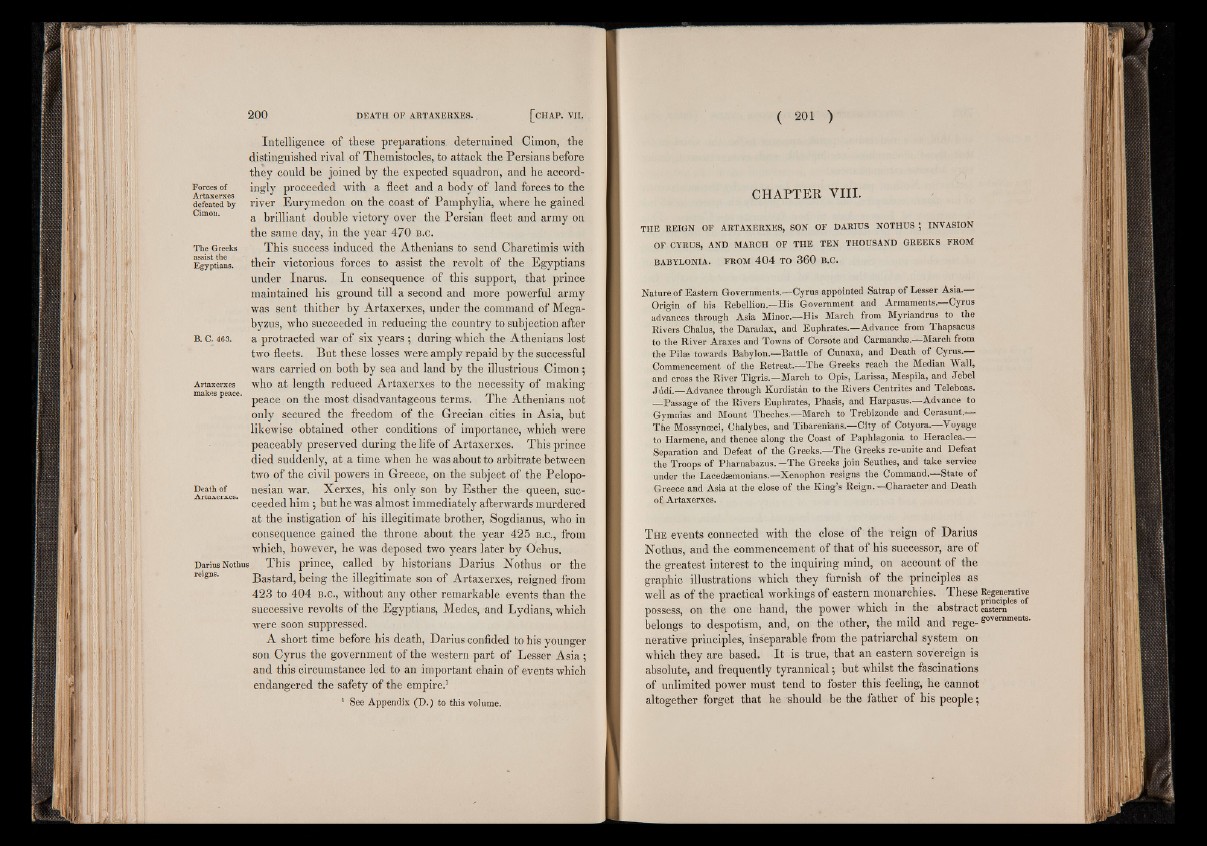
Intelligence of these preparations determined Cimon, the
distinguished rival of Themistocles, to attack the Persians before
they could be joined by the expected squadron, and he accord-
Forces of ingly proceeded with a fleet and a body of land forces to the
defeated by river Eurymedon on the coast of Pamphylia, where he gained
a brilliant double victory over the Persian fleet and army on
the same day, in the year 470 b . c .
The Greeks This success induced the Athenians to send Charetimis with
Egyptians, their victorious forces to assist the revolt of the Egyptians
under Inarus. In consequence of this support, that prince
maintained his ground till a second and more powerful army
was sent thither by Artaxerxes, under the command of Mega-
byzus, who succeeded in reducing the country to subjection after
B. C. 463. a protracted war of six years ; during which the Athenians lost
two fleets. But these losses were amply repaid by the successful
wars carried on both by sea and land by the illustrious Cimon;
Artaxerxes who at length reduced Artaxerxes to the necessity of making
es peace. pgace Qn ^jie most disadvantageous terms. The Athenians not
only secured the freedom of the Grecian cities in Asia, but
likewise obtained other conditions of importance, which were
peaceably preserved during the life of Artaxerxes. This prince
died suddenly, at a time when he was about to arbitrate between
two of the civil powers in Greece, on the subject of the Pelopo-
Death of nesian war. Xerxes, his Art&x6rx6S* only son by Esther the queen, sue- • ceeded him; but he was almost immediately afterwards murdered
at the instigation of his illegitimate brother, Sogdianus, who in
consequence gained the throne about the year 425 B.C., from
which, however, he was deposed two years later by Ochus.
Darius Nothns This prince, called by historians Darius Nothus or the
reigns. Bastard, being the illegitimate son of Artaxerxes, reigned from
423 to 404 B.C., without any other remarkable events than the
successive revolts of the Egyptians, Medes, and Lydians, which
were soon suppressed.
A short time before bis death, Darius confided to his younger
son Cyrus the government of the western part of Lesser Asia ;
and this circumstance led to an important chain of events which
endangered the safety of the empire.1
1 See Appendix (D.) to this volume.
CHAPTER VIII.
THE REIGN OF ARTAXERXES, SON OF DARIUS NOTHUS ; INVASION
OF CYRUS, AND MARCH OF THE TEN THOUSAND GREEKS FROM
BABYLONIA. FROM 404 TO 360 B.C.
Nature of Eastern Governments.—Cyrus appointed Satrap of Lesser Asia.—
Origin of his Rebellion.—His Government and Armaments.—Cyrus
advances through Asia Minor.—His March from Myriandrus to the
Rivers Chalus, the Daradax, and Euphrates.—Advance from Thapsacus
to the River Araxes and Towns of Corsote and Carmandæ.—March from
the Pilse towards Babylon..—Battle of Cunaxa, and Death of Cyrus.
Commencement of the Retreat.—The Greeks reach the Median Wall,
and cross the River Tigris.—March to Opis, Larissa, Mespila, and Jebel
Judi.—Advance through Kurdistan to the Rivers Centrites and Teleboas.
—Passage of the Rivers Euphrates, Phasis, and Harpasus. -Advance to
Gymnias and Mount Theches.—March to Trebizonde and Cerasunt.—
The Mossynoeei, Chalybes, and Tibarenians.—City of Cotyora.—Voyage
to Harmene, and thence along the Coast of Paphlagonia to Heraclea.
Separation and Defeat of the Greeks.—-The Greeks re-unite and Defeat
the Troops of Pharnabazus. —The Greeks join Seuthes, and take service
under the Lacedaemonians.—Xenophon resigns the Command.—State of
Greece and Asia at the close of the King’s Reign.—Character and Death
of, Artaxerxes.
T h e events connected with the close of the reign of Darius
Nothus, and the commencement of that of his successor, are of
the greatest interest to the inquiring mind, on account of the
graphic illustrations which they furnish of the principles as
well as of the practical workings of eastern monarchies. These Regenerative possess, on the one hand, the power which m the aTbs.at.rac1t. Princlples Of eastern
belongs to despotism, and, on the other, the mild and rege- 60T®mments-
nerative principles, inseparable from the patriarchal system on
which they are based. It is true, that an eastern sovereign is
absolute, and frequently tyrannical ; but whilst the fascinations
of unlimited power must tend to foster this feeling, he cannot
altogether forget that he should be the father of his people ;